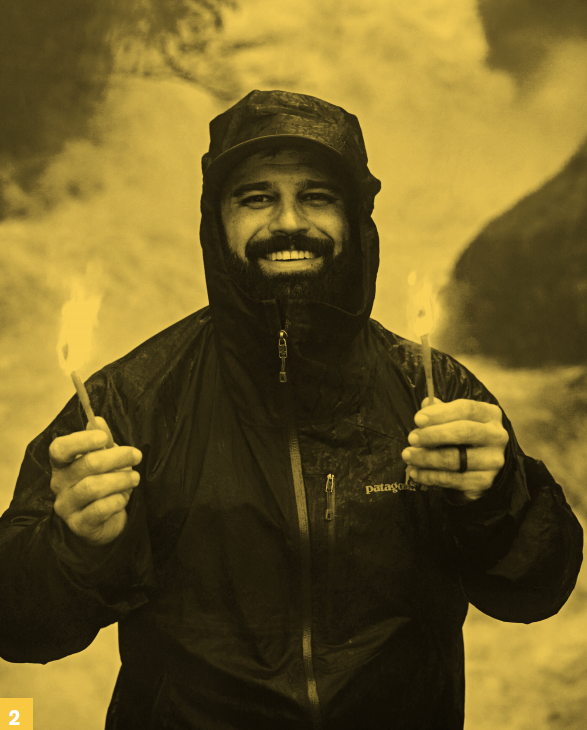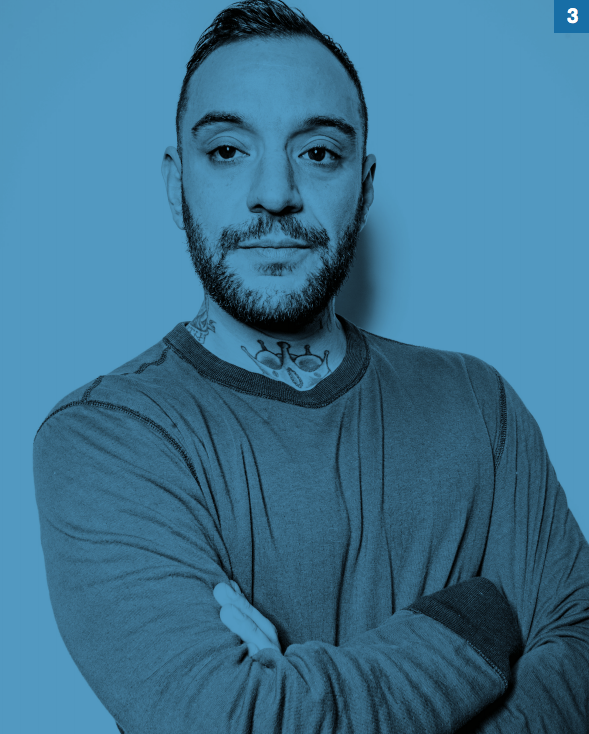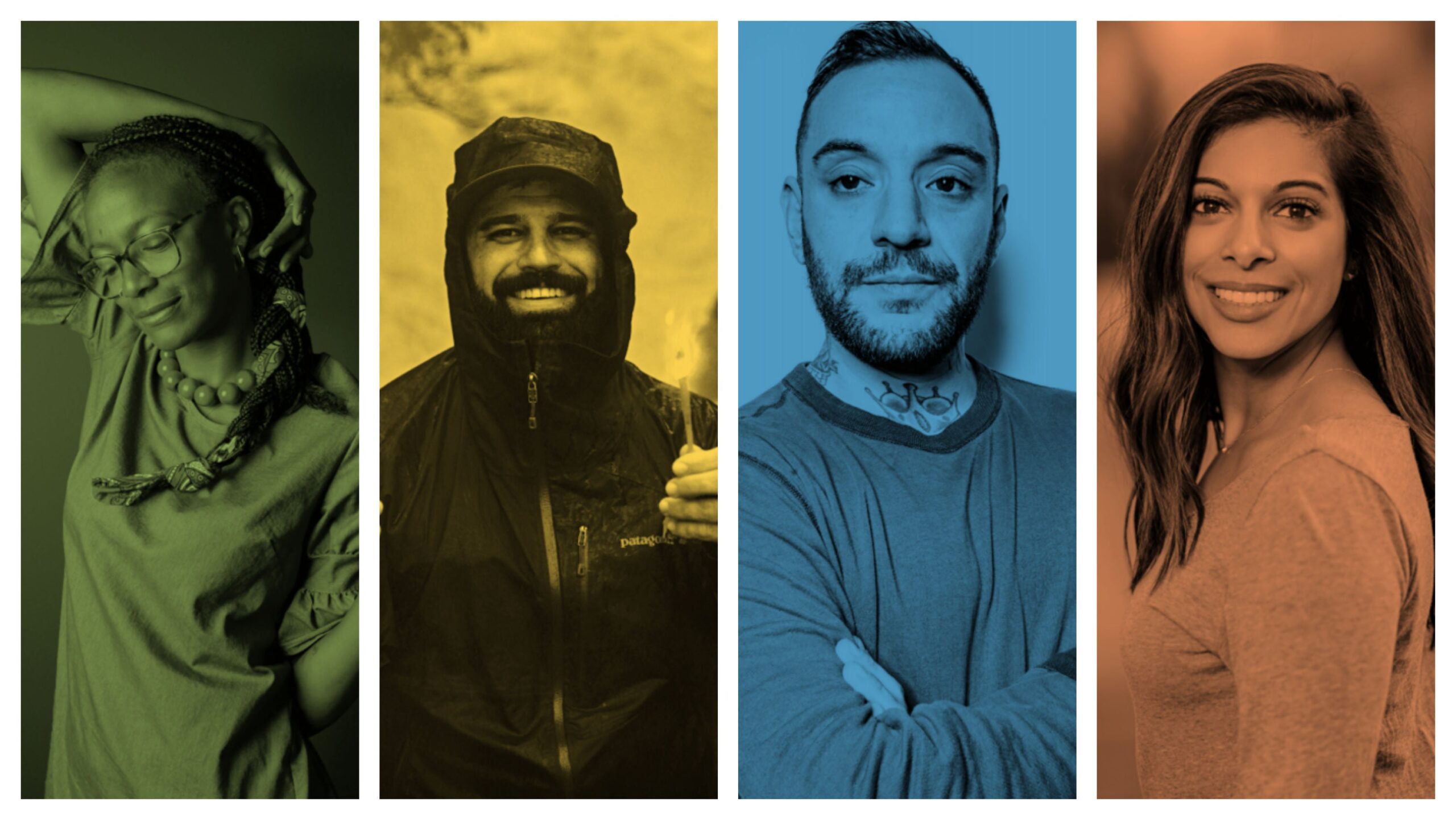Meet the future of the outdoor industry. These four are already pushing the boundaries of representation, inclusivity, creativity, and gear, and we can’t wait to see what they accomplish next.

1. Art
Latasha Dunston, 26, freelance illustrator��
Baltimore-born artist Dunston trained in scientific and preparatory medicine illustration in college. But when the Denver resident discovered en plein air painting—the full-on French Impressionist kind—it was an epiphany. “I didn’t know it was a thing people actually did,” she said. She built her own mobile setup and started to take it on hikes, leaving the four walls of her studio behind.
But it wasn’t until a trip to Lodged Out, an off-the-grid retreat in Leavenworth, Washington, that her style and voice came together: as a black woman, she realized that people of color are underrepresented in the outdoors. Whether she’s illustrating herself as the subject or making sure that her hand is represented in a photo of her paintings, she’s injecting her distinctiveness into the work she creates. “I want to showcase myself and the people like me who spend time on trails,” she said. “We are a reflection of nature, and nature is a reflection of us.”

2. Activism
Steven Reinhold, 34, founder of #TrashTag��
In 2015, while Reinhold was on a road trip, a receipt flew out of his car window—and he was haunted by the accidental littering. His penance? A vow to pick up 100 pieces of trash. The #TrashTag project was born—a social movement to inspire the masses to clean up.
It didn’t stop there. As an ambassador of UCO Gear, Reinhold brought his promise to the company, and they upped the ante by pledging to pick up 10,000 pieces by the next year. Then it caught on globally: an Arizona man shared a cleanup photo and asked “bored teens” to take before-and-after pics of a public area they’d cleaned, and the hashtag—also known as the #TrashTagChallenge—hit the big time. “All of a sudden,” Reinhold said, “it started spreading like wildfire.”
As of May, #TrashTag has been mentioned 92.5K times on Instagram—and counting. “It’s evolved from just picking up trash to a vehicle to talk about environmental issues,” he said. “It’s really cool that one flyaway receipt can have such a ripple effect.”

3. Safe Spaces
Rocco Kayiatos, 39, founder and director of Camp Lost Boys��
��
As a transgender man, Kayiatos has put his identity front and center for a while: he’s a hip-hop musician (stage name: Katastrophe) and he co-founded the first print publication dedicated to trans male culture, Original Plumbing. In 2017, he met two guys who’d gone on a retreat for trans men but didn’t find the transcendence they were seeking. So they built it: a rugged, summer camp–type weekend retreat called Camp Lost Boys. It’s the type of adventure that trans guys didn’t get to have as kids—or, if they did, didn’t experience as boys. (And most adult camps aren’t queer or trans friendly, says Kayiatos.)
Though campers participate in the usual—archery, hiking, fireside chats—they also detach from a false sense of connection via social media and reengage with real people outdoors, forming deep bonds between themselves and the land. For some, said Kayiatos, attending Lost Boys is a “last ditch effort to save themselves. They undergo a profound shift through the brotherhood they find in nature.”

4. Gear
Justine Barone, 33, co-founder and CEO of Gearo��
One day last year, Barone and her husband, Andrew, wanted to get outside for an adventure; they googled paddleboard rental in Denver and had to call scads of shops for pricing, availability, and product details. Ultimately, they gave up in frustration. “That’s when we realized the outdoor gear industry hadn’t transitioned to the 21st century,” she said.
After a few conversations with retailers, it became obvious to Barone that there was no platform to adequately manage rental transactions—so she launched Gearo to fill that void. Its goal is twofold: equip small rental shops with tools and software to manage their inventory, and provide adventure seekers with a single place to view bookable rentals. “Retailers can increase foot traffic and revenue because about 50 percent of all bookings are done online right now,” she said. Through Gearo, “I just want to take rentals to a whole new level,” she said. “We’re giving shops the ability to run like a Fortune 500 company.”


